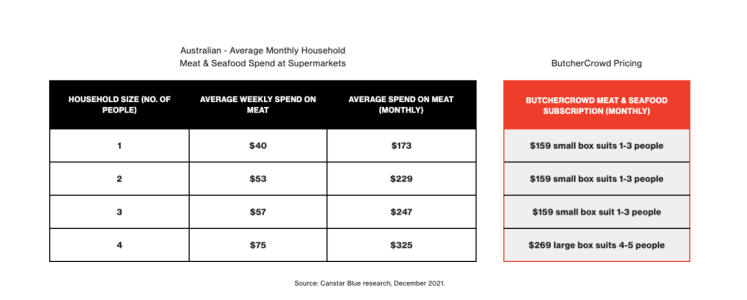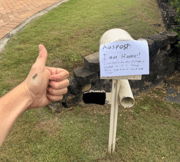The truth about supermarket meat that will make you want farm-to-plate today!
- Replies 32
When you stroll through the aisles of your local supermarket, the neatly packaged meat on the shelves might not tell the whole story of its journey to your dinner plate. ButcherCrowd* founders, brothers Damien and Rob Moffatt, want to change the narrative and bring the farm-to-plate experience to Australian tables*, ensuring that ethical farming practices and quality meat without the additives are not just a luxury, but a standard*.
The Moffatt brothers, who hail from Atherton Tablelands, were raised with a deep appreciation for meat sourced directly from their family farm. They knew the value of ethical farming and the taste of real, quality meat that hadn't been tampered with by additives. It was a stark contrast to the reality they found in most supermarket offerings—meat from animals that had never roamed freely and seafood that was far from being sustainably sourced.
Supermarket meat often comes with a hidden cost. To meet the demands of mass production and keep prices low, harmful chemicals are frequently used, and many products are imported from overseas. This approach prioritises corporate profits over health and sustainability. ButcherCrowd* stands as a stark contrast to this model, offering a marketplace for high-quality meat and wild-caught seafood sourced from Australian farming and fishing families who share their values*.
The difference is palpable. ButcherCrowd's beef, lamb, chicken, and pork are given the freedom to roam on pastures, and their seafood is wild-caught from sustainable fisheries*. The animals feast on fresh grass and breathe fresh air, living lives as nature intended. This humane treatment not only gives the animals a better quality of life but also influences the grade of your meat*. When you know where your meat and seafood come from and how they've lived, you feel more connected to your food and can make better decisions for your health and that of your loved ones.
If you want to understand more about this process, you can watch ButcherCrowd’s explanation video below.
ButcherCrowd's mission is to reconnect you with better food and a more ethical way of eating meat, sourced from Australian producers*. This connection doesn't come at a premium price either. Despite the common belief that high-quality, ethically sourced meat is more expensive, ButcherCrowd competes with supermarket pricing while supporting Australian farming and fishing families with fair prices*.
The table below illustrates how ButcherCrowd's pricing compares with that of major supermarkets. It’s no secret major supermarkets have been criticised for their treatment of suppliers but thankfully, ButcherCrowd offers a more supportive approach, and the price difference is minimal.
For those who are concerned about the cost, it's worth considering the words of a pensioner and member of the Seniors Discount Club: '[I'm] a pensioner and my first box arrived today - very happy to be supporting farmers trying to do the right thing and protecting their animals from the cruel treatment of animals in feedlot farms. If you saw the abuse you'd never buy commercially raised meat again - I'd rather be vegetarian.'
The choice to switch to farm-to-plate meat is not just about taste—it's a stand for animal welfare, environmental sustainability, and supporting local Australian producers*. While not everyone may be able to make the switch due to pricing and that is okay, those who do often find it a rewarding decision that aligns with their values.

So, will you make the switch to farm-to-plate?* Do you find the quality of the meat in supermarkets today different to the meat you grew up eating? Share your thoughts and experiences in the comments below!
*Please note, members, this is a sponsored article. All content of ours that has an asterisk (*) next to it means we may get a commission to write an article or post a deal. We simply do this to assist with the costs of running the SDC. Thank you!
The Moffatt brothers, who hail from Atherton Tablelands, were raised with a deep appreciation for meat sourced directly from their family farm. They knew the value of ethical farming and the taste of real, quality meat that hadn't been tampered with by additives. It was a stark contrast to the reality they found in most supermarket offerings—meat from animals that had never roamed freely and seafood that was far from being sustainably sourced.
Supermarket meat often comes with a hidden cost. To meet the demands of mass production and keep prices low, harmful chemicals are frequently used, and many products are imported from overseas. This approach prioritises corporate profits over health and sustainability. ButcherCrowd* stands as a stark contrast to this model, offering a marketplace for high-quality meat and wild-caught seafood sourced from Australian farming and fishing families who share their values*.
The difference is palpable. ButcherCrowd's beef, lamb, chicken, and pork are given the freedom to roam on pastures, and their seafood is wild-caught from sustainable fisheries*. The animals feast on fresh grass and breathe fresh air, living lives as nature intended. This humane treatment not only gives the animals a better quality of life but also influences the grade of your meat*. When you know where your meat and seafood come from and how they've lived, you feel more connected to your food and can make better decisions for your health and that of your loved ones.
If you want to understand more about this process, you can watch ButcherCrowd’s explanation video below.
ButcherCrowd's mission is to reconnect you with better food and a more ethical way of eating meat, sourced from Australian producers*. This connection doesn't come at a premium price either. Despite the common belief that high-quality, ethically sourced meat is more expensive, ButcherCrowd competes with supermarket pricing while supporting Australian farming and fishing families with fair prices*.
The table below illustrates how ButcherCrowd's pricing compares with that of major supermarkets. It’s no secret major supermarkets have been criticised for their treatment of suppliers but thankfully, ButcherCrowd offers a more supportive approach, and the price difference is minimal.
For those who are concerned about the cost, it's worth considering the words of a pensioner and member of the Seniors Discount Club: '[I'm] a pensioner and my first box arrived today - very happy to be supporting farmers trying to do the right thing and protecting their animals from the cruel treatment of animals in feedlot farms. If you saw the abuse you'd never buy commercially raised meat again - I'd rather be vegetarian.'
The choice to switch to farm-to-plate meat is not just about taste—it's a stand for animal welfare, environmental sustainability, and supporting local Australian producers*. While not everyone may be able to make the switch due to pricing and that is okay, those who do often find it a rewarding decision that aligns with their values.
Key Takeaways
- ButcherCrowd* is founded by brothers Damien and Rob Moffatt, who promote ethical farming practices and real, quality meat without additives.
- The company focuses on providing high-quality meat and wild-caught seafood from Australian farming and fishing families* who share their values.
- ButcherCrowd aims to offer a farm-to-plate process that connects consumers with better food by ensuring the animals have lived as nature intended, with access to roam and sustainable food sources.
- Despite being a premium service, ButcherCrowd competes with supermarket pricing* while supporting Australian producers and offering consumers the option to choose ethically raised meat and sustainably caught seafood.
So, will you make the switch to farm-to-plate?* Do you find the quality of the meat in supermarkets today different to the meat you grew up eating? Share your thoughts and experiences in the comments below!
*Please note, members, this is a sponsored article. All content of ours that has an asterisk (*) next to it means we may get a commission to write an article or post a deal. We simply do this to assist with the costs of running the SDC. Thank you!








